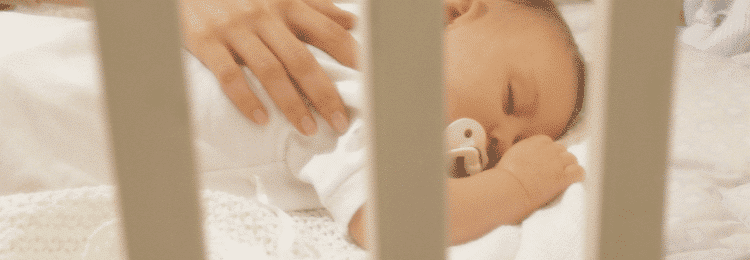6 Month Sleep Regression: Signs and Tips
Trying to perfect your baby’s sleeping pattern is near impossible. Some parents may find sleep training easier than others. But if you’re not succeeding, it’s definitely not anything you’re doing wrong! In this blog, we’re covering six mont sleep regression but if your little one is a bit older please see our 12 month sleep regression article.
This blog includes:
- What is a sleep regression?
-
Is there a 6 month sleep regression?
-
Why do babies have sleep regressions at 6 months?
-
Is there always a 6 month sleep regression?
-
How long does the 6 month sleep regression last?
-
6 month sleep regression or teething pains
-
Signs of a 6 month sleep regression
-
Can you share your best tips to handle sleep regression at 6 months?
-
What causes 6 month sleep regression?
-
Can overtiredness cause a sleep regression?
-
How much is too much sleep in the day at 6 months?
-
Will a 6 month baby usually sleep through the night?
-
What sleep cues do 6 month olds have?
-
If my 6 month old wont fall asleep without being help what do you recommend?
What is a sleep regression?
The term ‘sleep regression’ is a bit misleading but is often referred to as a point at which your child’s sleep appears to go backwards and/or changes.
This can put quite a negative term on what is an important developmental milestone.
How your baby slept a few weeks previously may now feel totally different to your current situation, sleep even for adults isn’t linear, it changes day to day, depending on our emotional state, how active we have been that day, experiences from the day etc so babies experience this even more because they can’t make those associations which is why they look to you for comfort and reassurance and all their basic needs.

Is there a 6 month sleep regression?
We do see changes around 6 months developmentally so as explained previously these milestones can impact on sleep. Remember though that learning and development is continuous and occurs at different times for different babies and this doesn’t necessarily appear at exactly 6 months.
Why do babies have sleep regressions at 6 months?
There are a couple of reasons we often see changes in sleep around 6 months. Firstly ‘Separation Anxiety’ kicks in. Your baby is starting to be more aware of their surroundings and this will trigger feelings and responses that are difficult to process and understand. They will look for their main carer to provide the comfort and reassurance they need which enables them to feel safe again. When you are not with them feelings of anxiety and confusion can kick in so of course they want to be close to you for that support and comfort.
We are also approaching the period of when ‘Object Permanence’ is being seen. This means that they realise people and objects still exist even when they can’t be seen. So babies become upset knowing their parent is no longer visible even though you exist. Because of this they often feel they are ‘missing out’ on what is happening out of their sight.
Generally if your baby calms after a few minutes of being held the cries/upset will settle then it is probably separation anxiety. If they continue to be upset there might be another reason for this, including they are just overtired or even under tired.
They are also becoming more active physically and as mentioned previously this can mean they are much more active in their sleep and have less deep sleep which can see them wake more frequently. They are literally practicing all these skills when asleep which can be disruptive for them and unfortunately for you too! It can help to see it from a different perspective. As an adult maybe you are starting a new job, been on a course, reading up on different topics. If we have tried to take in too much information this can then lead us to feeling overwhelmed and possibly quite panicky, particularly if you need to share what you have learned. It’s the same for babies, too much stimulation or too much overwhelm with all these new skills can then make them more restless and unable to relax or settle enough to go to sleep.
Is there always a 6 month sleep regression?
While it’s common, it doesn’t happen with all babies. There is no way to determine whether or not your baby will go through this stage.
It is also worth remembering that babies develop at varying rates. So, don’t worry if all the little ones at the baby group have gone through it and yours hasn’t. It doesn’t mean there’s a problem.
Even though you can’t predict the sleep regression, or prevent it, you shouldn’t ignore it. It’s a good idea to get your baby into a solid routine so they can build healthy sleep habits.
How long does the 6 month sleep regression last?
This is a difficult question as all babies are different and development is continuously happening at this age so new learning is ongoing which can all impact on the baby’s sleep.
6 month sleep regression or teething pains
Sometimes we just don’t know the precise cause of what is happening. If you feel they are teething then it can be worth using some teething powder, (I prefer the powder to the gel as I find that for some babies the gels can irritate the tummy)
Whether they are teething or going through some sleep ‘regression,’ or just having a disturbed night I always suggest you respond to their cries or cues in a calm manner, soothing in a way which helps them settle down. By doing this you don’t have to always know why they are upset or having a difficult time you can always be responsive.
Signs of teething include:
- Sore gums with redness
- a high temperature
- Redness in the cheeks
- Excess dribble
- Irritable
To deal with teething, you can use a teething ring or a child-friendly pain-killing medicine. Teething rings work best when they are slightly cold. However, you must not put the teething ring in the freezer as this can cause gum damage. The ring should state how long to cool it for.

Signs of a 6 month sleep regression
Irritable mood
If your baby isn’t getting enough sleep through the night it’s quite likely that they’ll be displaying signs of irritability. They may display this through being more teary or not wanting to play.
Early wake ups
A clear sign that your baby’s sleep regression is starting is when they’re waking up earlier in the morning. Maybe now it’s a 5:30 wake up when it used to be 7:30. That change can make a big difference.
Six month old babies need around 12 hours of nighttime sleep. They may also be having 3 naps in the daytime, with a few hours between each one. Pay attention to your baby’s sleep cycles and you may spot the next sleep regression early, if there is one.
Don’t worry if this is not the typical pattern that your baby’s sleep patterns follow. If you are worried about sleep regressions or sleep problems you could seek medical advice.
Night waking and inconsistent sleep
At six months old, your baby probably doesn’t wake for night feeds anymore. That means they may well have been sleeping through before the regression started.
In a sleep regression, babies can wake more often and also take longer to get back to sleep afterwards.
Refusing naps or having longer naps
As a parent, you can definitely tell when your baby is tired. They’ll rub their eyes and maybe seem a little irritated. In a sleep regression, they can refuse to sleep even when they’re over tired.
Alternatively, you might find that they are napping for longer stretches of time.

Can you share your best tips to handle sleep regression at 6 months?
1. Have realistic expectations.
Your child is likely to need support and comfort during their sleep/wake times. Accept that sleep disruption is a normal part of your child’s development, and as frustrating and tiring as it is you are not doing anything wrong
2. Play Games
Play games such as ‘peek a boo’ in the day to help your baby learn you are still there even when they can’t always see you. Most babies love this so you are likely to be able to engage them in this.
3. Practice Alone Time
Practice leaving the living room area for really short periods of time and then return and go straight to your baby for cuddles or play. We are talking seconds in the beginning.
4. Tell your baby when you are leaving
Always let your baby know if you are leaving the room, whether this be at home, at night or in Day Care. Never just ‘creep’ out. At 6mths they may not understand but if you start this young your baby/child will know you are honest and open with them.
5. Be Consistent
Have a consistent Bedtime routine, Nap routine, feeding routine, these will all help contribute to a positive sleep environment and set up those early foundations for good quality sleep.
6. Provide Comfort
Accept your 6-month-old may need close comfort and your presence at sleep times. Just be as calm and low key as possible but responsive to their emotional needs at this time.
7. Be kind to yourself
Accept offers of support during the day and/or night to give you a break. Find ways you can meet some of your own self-care needs. Meeting a friend, having a nice long bath, eating well.
What causes 6 month sleep regression?

If it’s causing problems, you probably want to know why. Generally speaking, the six month sleep regression is associated with developmental milestones rather than sleep problems. So, while it’s not the best thing to go through, it actually shows you’ve got a learning, developing and growing baby.
Chatting away
At this stage, your baby is probably discovering all kinds of noises they can make. You might even feel like you’re having a proper conversation with them and they’re even good company. It’s likely that one cause of sleep regression is actually your baby waking themselves up making noises.
Separation anxiety
Separation anxiety is not easy for any baby or parent to go through. At this stage in your baby’s growth, they may start showing signs of separation anxiety.
These can include:
- Crying when a parent leaves the room
- Preferring one parent over another
- Clinging to a parent
- Needing a parent nearby to sleep
- Moving around
Everyone moves around during the night, but your baby is probably just learning to sit and roll. It’s no wonder they want to do it all day long, even if it might be the cause of sleep regressions.
There’s a chance that through your baby learning these new skills, they’re waking up in the night trying them out. If they’re rolling, they might have done it in their sleep and woken up!
Try not to worry if your baby is going through a 6 month sleep regression, it’ll be done soon! Also remember that all babies are different and grow at different rates. We hope this has been helpful and you can build great sleep habits with your child.
Can overtiredness cause a sleep regression?
Overtiredness doesn’t cause a sleep regression as such but it can certainly disrupt sleep. Trying to find a nap routine that works for your baby along with an appropriate bedtime can all help. Noting your baby’s wake windows and tiredness cues are also important.
Wake Windows are hugely broad for different children so don’t totally rely on these. Use them alongside learning your baby’s own tired cues.
Another thing to keep an eye on is how long it takes your baby to fall asleep. So we call this SOL (Sleep Onset Latency). This is the point at which you place your baby in their sleep space and the time it takes for them to fall asleep.
Under 5 mins likely to be overtired and over 20mins could be over or under tired. If they go to sleep too quickly, so under 5mins the body will often take them to a Deep Sleep stage too quickly which means they are not entering the sleep cycle pattern correctly.
Over the 20min is also an indicator that your baby still needs your support and intervention to fall asleep. This is okay, they are still very young and if they need your help to fall asleep that’s fine.
If your baby is overtired and upset, agitated, the chance of them falling asleep is very low. When they are in this state they need to be calmed and comforted before you have a chance of them sleeping.
The body will be raging with cortisol (stress hormone) and that needs settling before they will be relaxed enough to fall asleep. (This is why I don’t leave babies/children crying on their own)
How much is too much sleep in the day at 6 months?

I would expect a baby of this age to need 2 ½ -3 hours of day sleep, but again all babies needs vary so you will need to see what works for them. If they are not tired at bedtime and having disrupted nights and seem to need less sleep in the day then you may need to review this.
Will a 6 month baby usually sleep through the night?
This depends what you mean as ‘sleep through the night’. Society often misinterprets this as sleeping a 12hr stretch in the night. This is unrealistic. If a baby is managing a 5hr stretch and then needing a feed for example that would be sleeping through. The reason your baby wakes is because they are hungry for example so once fed should settle back to sleep fairly quickly.
Most babies will still need 2-3 feeds in the night at this age. Only 20% of 6mth olds sleep a 12hr night.
What sleep cues do 6 month olds have?
Disengaging from surroundings, quietening in their interactions and play, rubbing eyes, yawning, pulling ears, fussiness. As you start to notice these cues you should hopefully be able to respond fairly quickly. As soon as cues are being shown you need to move on to your wind down/bedtime routines.
If my 6 month old wont fall asleep without being help what do you recommend?

1) Recognise the connection you have with your baby
First recognising the wonderful connection you have with your baby. They know they are safe and can rely on you when they are faced with some difficulty, in this case, to fall asleep.
2) Understand the reasons
That, as we discussed earlier your baby knows now you are not with them all the time and they don’t like it, understanding this can help you see why the situation is as it is.
3) Reflect on your methods
Then it depends on your own parenting styles and what you are comfortable with. Personally I start by looking at the support currently being given and look for what would be a step on from this. For example- being rocked to sleep. I would move to a swaying motion and slow rhythmic back pats, in arms as a starting point. Then no swaying but still holding. Then progressing to support in cot/sleep space. But the way you respond as a parent will really vary and you may find if you have more than one child that their response needs vary considerably.
4) Create a good Sleep Environment
The other important aspect is to ensure all factors which support sleep are in place. By this we mean having an environment that is conducive to sleep. Temperature (16-20 degrees), sleep wear- I always recommend cotton material, bedtime routine, white noise (if using), quietening interaction. You may want to include a bathtime some or all nights. Then have a ‘good night’ phrase that signals it is now sleep time.
Please note if using white noise that the volume is that of a running electric shower the other side of a closed door and the device being used is at least 3ft from where your baby sleeps)
You want to avoid musical mobiles, lights on the ceiling as these can be detrimental to sleep.
5) Transfer Your Baby to their Own Room
You may at this age want to transfer to their own room. (6 months is the youngest we recommend for this). If choosing this then I recommend ‘Camping Out’ with them which basically means for a period of time you will sleep with your baby next to their cot so you are always there when they wake/stir in the night. Then you can start other support approaches which will see you reducing that support. I also use this approach when parents have been co-sleeping with their baby/child.
6) Be Calm
Mirror calmness. When your baby becomes upset/distressed/fussy, it is so easy to panic and become stressed yourself or feel you are doing everything wrong. This is not the case at all. It is not always easy to figure out why your baby is upset. By focusing on your own breathing, keeping calm, being confident (even if you don’t feel it!) and attuned to what is happening this is showing your baby there is nothing to worry about, you are in charge and they can rely on you for comfort and support. If you are getting too overwhelmed yourself then try and swap with your partner until you are calm enough and in the right headspace to take back over.
My name is Julie Heginbottom and I have worked with families for over 30years. I have supported families in their home as a private Maternity Nurse (Non-medical), Nanny, Night Nanny and a Sleep Consultant. I was also an Early Years Development Officer and Childcare Tutor. I am still working as a tutor and course developer for a company in London where we train Maternity Nurses and Sleep Consultants.
My aim when supporting parents is to empower them so they are able to have confidence in their parenting skills and ethos and not be overwhelmed by all the information we are exposed to. I believe in Responsive, Supportive approaches when working with families which focuses on meeting emotional needs for babies/children and parents/carers. Emotional Wellbeing and security is one of my top priorities, which means I do not practice 'Cry-It Out approaches' in my sleep work. I also enjoy helping parents learn more about sleep and expectations around sleep.


















